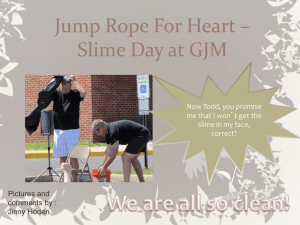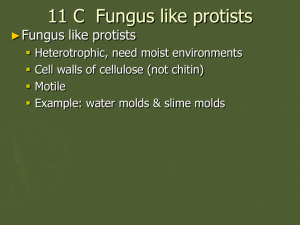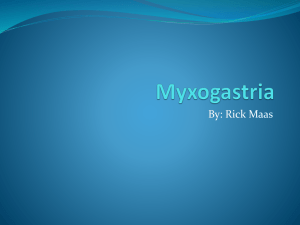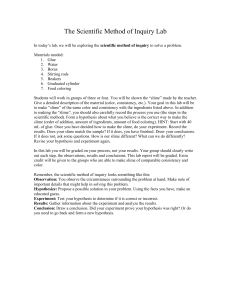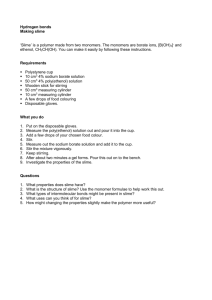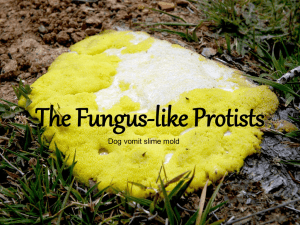O RGSP NEWSLETTER LMU Professor and Student Study Slime Molds in Africa
advertisement
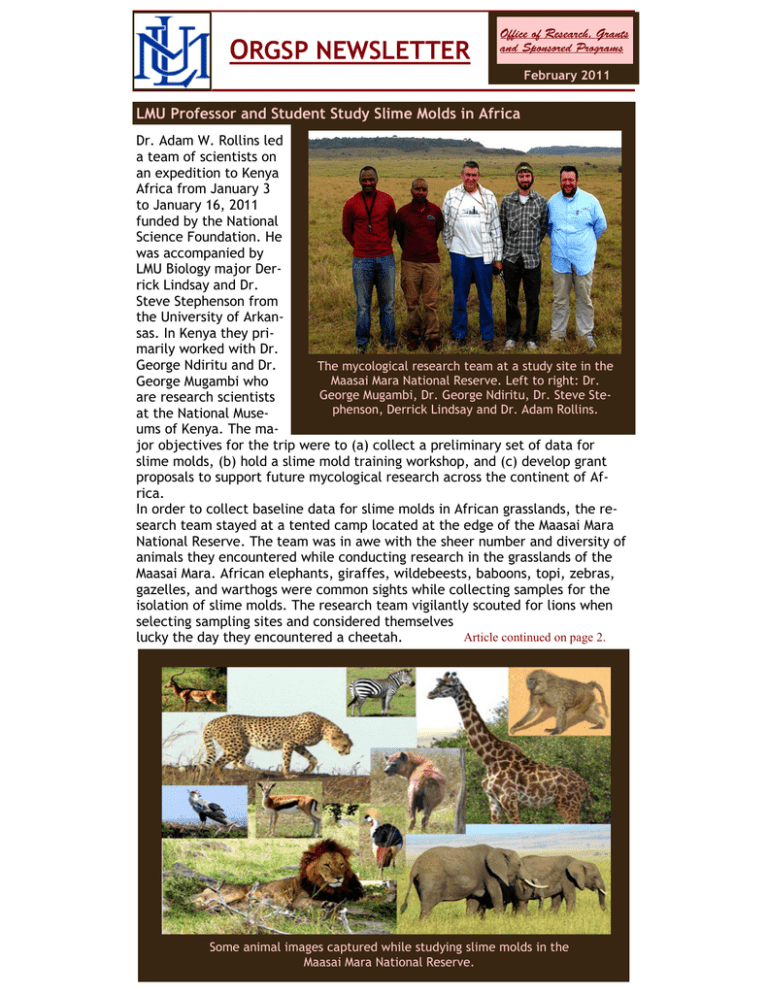
ORGSP NEWSLETTER February 2011 LMU Professor and Student Study Slime Molds in Africa Dr. Adam W. Rollins led a team of scientists on an expedition to Kenya Africa from January 3 to January 16, 2011 funded by the National Science Foundation. He was accompanied by LMU Biology major Derrick Lindsay and Dr. Steve Stephenson from the University of Arkansas. In Kenya they primarily worked with Dr. George Ndiritu and Dr. The mycological research team at a study site in the Maasai Mara National Reserve. Left to right: Dr. George Mugambi who George Mugambi, Dr. George Ndiritu, Dr. Steve Steare research scientists phenson, Derrick Lindsay and Dr. Adam Rollins. at the National Museums of Kenya. The major objectives for the trip were to (a) collect a preliminary set of data for slime molds, (b) hold a slime mold training workshop, and (c) develop grant proposals to support future mycological research across the continent of Africa. In order to collect baseline data for slime molds in African grasslands, the research team stayed at a tented camp located at the edge of the Maasai Mara National Reserve. The team was in awe with the sheer number and diversity of animals they encountered while conducting research in the grasslands of the Maasai Mara. African elephants, giraffes, wildebeests, baboons, topi, zebras, gazelles, and warthogs were common sights while collecting samples for the isolation of slime molds. The research team vigilantly scouted for lions when selecting sampling sites and considered themselves Article continued on page 2. lucky the day they encountered a cheetah. Some animal images captured while studying slime molds in the Maasai Mara National Reserve. ORGSP NEWSLETTER February 2011 LMU Professor and Student Study Slime Molds in Africa (continued) Next the team visited the Aberdare Mountains and Mount Kenya to gather baseline data on the slime molds associated with high-elevation forests of Africa. This particular data will be compared with data collected by Rollins and Stephenson from high-elevation forests in Thailand, Costa Rica, and the Great Smoky Mountains. The team was pleased since they were able to collect several slime molds that had developed under natural conditions in the field. In addition to the research component, the participants enjoyed watching the vegetation change as they ascended the mountains as well as seeing waterfalls, snow, and glaciers all while straddling the equator. In addition to the field work, Dr. Rollins, Dr. Stephenson, and Dr. Ndiritu organized a workshop entitled, ―Introduction, Taxonomy, and Ecology of Eumycetozoans (Slime Molds)‖ held at the National Museums of Kenya in Nairobi Kenya on January 14, 2011. This event represented the first workshop on this subject held anywhere on the entire African continent. The program consisted of several morning lectures and an afternoon hands-on laboratory component. Derrick Lindsay (LMU Biology major) gave a talk to the participants where he described his experiences in slime mold research from the perspective of an undergraduate student. Thirty-two participants were awarded certificates of completion at the conclusion of the workshop. The workshop was considered a success, as many of the participants lingered after the workshop and discussed various slime mold topics, ranging from taxonomy to potential research projects. The trip was an overwhelming success for all involved. The researchers are currently developing grant proposals and Derrick experienced an incredible training opportunity and experiences of which the ultimate impacts are beyond measure. The samples will be processed, analyzed, and it is anticipated that they will yield data that will ultimately result in a manuscript for publication. The research team hopes that the trip to Kenya will serve as a starting point for future research activities and collaborative projects that will take place in Kenya as well as across the African continent. Article and photos provided by Dr. Adam Rollins Participants in the slime mold workshop held at the National Museums of Kenya. ORGSP NEWSLETTER February 2011 Nursing’s Education Summit Presentation by Dr. Robin Wilson An abstract submitted by Dr. Robin Wilson, Assistant Professor of Nursing, for the National League for Nursing’s Education Summit 2011, entitled ―Use of an NLN Core Competencies Workshop to Improve Nurse Faculty Practice‖ has been accepted for a poster presentation. The selection process was competitive and over 400 abstracts were received. Dr. Wilson will be showcasing the research she completed during her dissertation process this past year at Liberty University. The Summit will take place in Orlando, Florida this September. Article and photo provided by Dr. Robin Wilson Business Department Paper Presentation this March The paper (#C11108) entitled "The Antecedents to Microlending as Corporate Strategy," has been accepted for presentation at the SAM International Business Conference to be held in Orlando, Florida, on March 31-April 3, 2011. The paper was co-authored by Jack McCann, Ph. D., Dean-LMU School of Business; Suhanya Aravamudhan, Ph. D. and Assistant Professor of Business; Don McCarren, Ph. D., Assistant Professor of Business; and Okeniyi Oke, Ph. D., Assistant Professor of Business. This paper was produced as a result of an LMU minigrant. It will be published in the proceedings of the conference and has an opportunity to be published in the SAM Advance Management, if chosen from among the other conference submissions. Article provided by Dr. Jack McCann LMU Professor Involved in Shaken Baby Syndrome Trial Dr. Charles Lugosi, Assistant Professor of Law, was involved in a Shaken Baby Syndrome trial that was recently reported in the New York Times. His involvement continued through the 2007 retrial, which concluded last fall. The trial concerned a baby named Philipp Baumer, born to Victoria Baumer, who had given up her last baby for adoption and who struggled with drug addiction. Victoria’s sister, Julie, offered to take guardianship of Philipp. Under Julie’s care, there was a time when Philipp was unable to keep his food down for more than 12 hours, so Julie took Phillipp to a Detroit emergency room. After Philip waited in the hospital for 28 hours in order to receive a CAT scan, extensive subdural and retinal bleeding were discovered. In an emergency operation, a shunt was placed to relieve the pressure on Philipp’s brain, but it was too late to prevent severe damage. Seven-year-old Philip now suffers from cerebral palsy; he cannot walk on his own, talk or see. Julie was convicted and sentenced to 10 to 15 years for Philipp’s injuries in 2005. Dr. Lugosi was called in as part of the defense team for the re-trial. His examination of two key medical experts was read into the record and accepted by the jury. Thanks to these defense testimonies, Julie was found not guilty by nine out of twelve members of the jury. This case was pro bono and lasted for a period of several years. Dr. Lugosi’s team won against near impossible odds. Article Information provided by Dr. Charles Lugosi and New York Times. For more information on this trial and others like it, please follow the link: http:// www.nytimes.com/2011/02/06/magazine/06baby-t.html?pagewanted=7 ORGSP NEWSLETTER February 2011 Professor Jonathan Leo Studies Conflicts-of-Interest in Medical Field Dr. Jonathan Leo, Associate Professor of Neuroanatomy, recently published an article through BioMed Central entitled ―Knowledge of ghostwriting and financial conflicts-of-interest reduces the perceived credibility of biomedical research. The research entailed the use of Statistics concerning the impact of conflicts-of-interest (COI) in academic medicine. There has been very little research performed on the reaction of practicing clinicians to the disclosure of such conflicts. Therefore, Dr. Leo and his associate developed two research vignettes presenting a fictional antidepressant medication study, one in which the principal investigator had no COI and another in which there were multiple COI disclosed. They confirmed the face validity of the COI vignette through consultation with experts. Hospital-based clinicians were randomly assigned to read one of these two vignettes and then administered a credibility scale. Using a Mann-Whitney U test, the researchers found a 95% confidence interval between 6.99 and 15.00 points, with a p-value less than .001. These were very significant results and thus they were able to conclude that in their study, increased disclosure of COI resulted in lower credibility ratings. Article Provided by Dr. Jonathan Leo Dr. Wilcox to Present at American Chemical Society National Meeting Dr. Roy Wilcox, Assistant Professor of Chemistry, will be presenting a paper entitled ―The Effect of Thixotropic Fluid Composition and Rheological Properties on Suspension of Magnetite Particles in a Magnetic Field‖ at the American Chemical Society National Meeting in Anaheim, California, on March 27, 2011 in the Colloid and Surface Chemistry Division. The focus of his research is to develop stable drug-coated magnetic particles with a bio-absorbable polymer for tumor targeting. Article Provided by Dr. Roy Wilcox Dr. Rollins’ Paper Listed as one of “Most Read Articles” for January Dr. Adam W. Rollins’ recent paper entitled, ―Changes in Forest Composition and Structure Across the Red Spruce-Hardwood Ecotone in the Central Appalachians‖ published in Castanea was listed as one of the ―Most Read Articles‖ for the month of January 2011. This ranking was reported on the website of BioOne a non-profit organization that catalogs and serves as a database for peer-reviewed publications in the fields of biological, ecological, and environmental sciences. Dr. Rollins is an Assistant Professor of Biology at LMU. Article Provided by Dr. Adam Rollins Dr. Callahan Invited to Participation in Social Work Convention Dr. Ann Callahan, Assistant Professor of Social Work, has been invited to participate on the planning team for the 2013 Convention sponsored by the North American Association of Christians in Social Work (NACSW) in Atlanta, GA. Article Provided by Dr. Ann Callahan ORGSP NEWSLETTER February 2011 Molecular Ecologist Visits LMU to Study Slime Mold DNA Dr. Katie Winsett visited the LMU campus in Harrogate from February 6 to 12, 2011. Dr. Winsett earned her Ph.D. from the University of Arkansas where she used molecular techniques to study the ecology of slime molds. Currently, the use of molecular techniques in ecology is relatively rare; however, this will likely change as the discipline evolves. During her visit Dr. Winsett trained Dr. Adam Dr. Katie Winsett extracting DNA from slime Rollins in the use of current molds in LMU’s molecular lab. molecular techniques as they apply to the study of slime mold ecology. This work utilized both the Cumberland Mountain Research Center (CMRC) and Dr. Ryder’s molecular lab in Farr Hall. During her visit, Dr. Winsett taught two lab sections of Molecular Genetics (BIOL-215) where she presented a lab that she developed entitled, ―The rise and fall of Hyperamoeba: using the tools of molecular biology to organize living things‖. Furthermore, she presented a guest lecture to the Evolution class (BIOL-410) entitled, ―Molecular ecology and the new kingdoms of life: how molecular biology has changed the organization of living things‖. Dr. Winsett interacted with LMU undergraduate students conducting research projects at the CMRC. Dr. Rollins and Dr. Winsett intend to conduct a series of molecular studies with slime molds that will ultimately result in publications, the first of which they hope to submit before the beginning of the Fall 2011 semester. Article and photo provided by Dr. Adam Rollins. Recent Grant Submissions Dr. Mary Anne Modrcin – Applications submitted to the Good Samaritan Foundation and the Dr. Scholl Foundation, for nursing scholarships. Tom Mackie- Application submitted to the Abraham Lincoln Bicentennial Foundation for an ALLM exhibit in conjunction with the East Tennessee Historical Society Dr. Stan C. Kunigelis, Associate Professor of Basic Medical Sciences Anatomy and Physiology at DCOM—Application submitted in collaboration with Mr. Christopher Stotts, Instructor of Chemistry, Physical Science, Life Science, and Earth Science in the American Physiology Society’s ―Frontiers in Physiology for Research Teacher Professional Development Program‖. Recent Grant Awards Grant funded by the Algernon Sydney Sullivan Foundation for three social work students and one professor to participate in the Social Entrepreneurship Scholars Program training on social entrepreneurship. ORGSP NEWSLETTER February 2011 Foundation Corner Last month I wrote about inspiration. This month, my focus is on motivation and time management. As I get involved in projects, committee meetings and all sorts of other worthy distractions, I find it difficult to attend to the tasks at hand. It’s not that I am any less committed to the grant process. It just seems that the day slips away faster than I can keep up with it. My Outlook calendar, a to-do list and sticky notes keep me organized. However distracted or involved I am in projects, there is no way to avoid grant deadlines! The grant process need not be daunting for anyone. Remember that all grant proposals must begin with Pauline in ORGSP, Marca in DCOM or me in Kresge to insure proper internal procedures are followed. I suggest you gather input from other people and collaborate with them. Rely on their expertise, contacts and resources to help you define the scope of the project and develop a workable budget. Doing research, putting thoughts on paper and then editing the narrative will eventually result in a well designed project and grant proposal. Here’s what all foundations look for in a successful grant proposal: a statement of need, clear goals and measurable objectives, knowledge of resources at hand, realistic activities to address the problem and a feasible budget. Talk to Pauline, Marca and me for guidance. We will help you follow application guidelines. Pay attention to deadlines and don’t lose those sticky notes! You can reach Martha at (423) 869 6398, or martha.scheidler@lmunet.edu Upcoming Funding Opportunities and Deadlines Details and deadlines for each opportunity can be found by clicking on the corresponding links. This list can also be found on the ORGSP website under funding sources, as well as a variety of public, private, and institutional funding source databases. http://www.lmunet.edu/curstudents/ORGSP/funding-sources.shtml Fine Arts Educational Humanities International Sciences Health Related Social Sciences Unrestricted / Other Federal Registrar Minorities / Women ORGSP NEWSLETTER February 2011 A Note From the LMU Institutional Review Board Please remember that all research proposals and projects involving human subjects, must have IRB approval prior to the presentation of any information gathered during the course of the research. Under federal policy, the IRB cannot grant retroactive IRB approval. For more information regarding the LMU IRB, please visit http://www.lmunet.edu/curstudents/ORGSP/IRB.shtml. ORGSP Contact Information pauline.lipscomb@lmunet.edu or call (423) 869-6214 carolyn.gulley@lmunet.edu or call (423) 869-6291 laura.gambrel@lmunet.edu or call (423) 869-6834 If your grant award, application, presentation, or publication has not been mentioned in this edition, please forward your information to us using the contact information listed. The ORGSP is located in Duke Hall, Suite 304 As a reminder, all applications for external funding must first begin by contacting the ORGSP. The ORGSP staff would like to thank everyone for their submissions to the newsletter!
